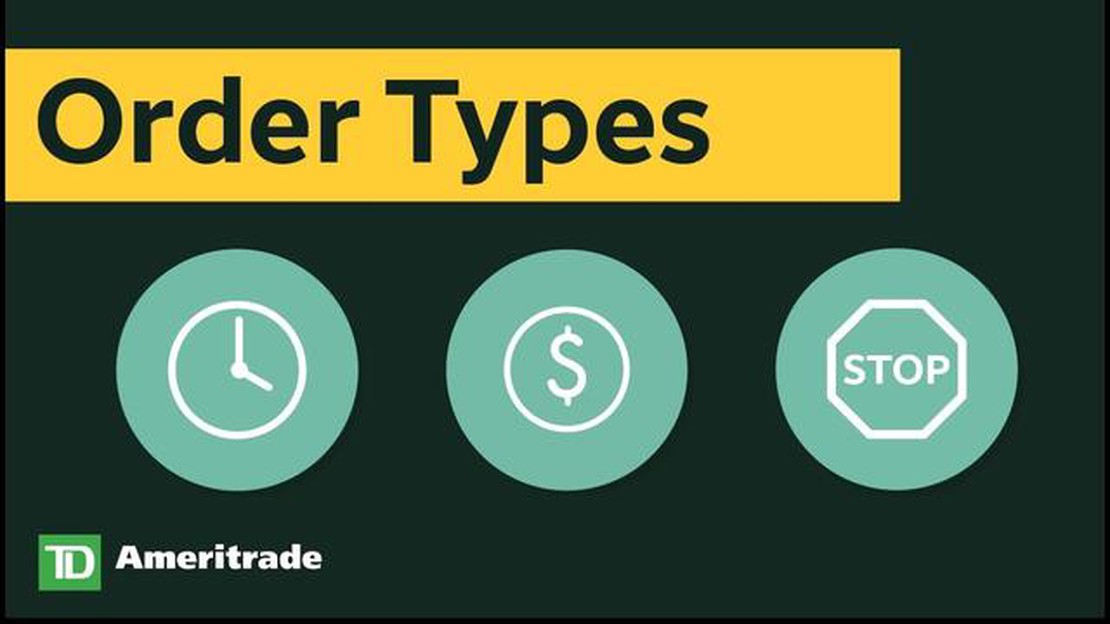Is the Housing Market in Brooklyn Experiencing a Decline in Prices?
Are housing prices in Brooklyn going down? The housing market in Brooklyn has always been a hot topic of discussion, with its trendy neighborhoods, …
Read Article
When it comes to investing in the stock market, understanding how stock orders work is essential. Stock orders are instructions given by investors to brokers to buy or sell a specific number of shares at a specified price. These orders play a crucial role in the functioning of the stock market, as they determine the price at which stocks are bought and sold.
There are several types of stock orders, each with its own significance and implications. Market orders, for example, are executed immediately at the prevailing market price. They are ideal for investors who want to buy or sell stocks quickly, without much regard for the exact price.
Limit orders, on the other hand, allow investors to specify the maximum price they are willing to pay when buying stocks, or the minimum price they are willing to accept when selling. This type of order gives investors more control over their trades, but it may also take longer to execute, as the stock must reach the specified price.
Stop orders are another type of stock order that investors can use to protect themselves from losses or capitalize on potential gains. A stop order becomes a market order when the stock reaches a specified price, allowing investors to buy or sell at the best available price.
Understanding the different types of stock orders and their significance is crucial for investors looking to navigate the stock market effectively. By using the right order at the right time, investors can take advantage of price fluctuations, protect themselves from losses, and maximize their investment returns.
Read Also: How to Set Moving Average Indicator in MT4: Step-by-Step Guide
In summary, stock orders are essential instructions given by investors to brokers to buy or sell stocks. They come in various types, including market orders, limit orders, and stop orders, each with its own implications. Understanding these orders’ definitions and significance is crucial for investors looking to make informed decisions and succeed in the stock market.
Stock orders are instructions given by investors to a brokerage firm to buy or sell shares of stock on their behalf. These orders are an essential part of the stock market, as they dictate the timing and price at which the transactions occur.
There are different types of stock orders that investors can use depending on their objectives and preferences. The most common types include:
Understanding and effectively using stock orders is crucial for investors to navigate the stock market and achieve their investment objectives. By choosing the right type of order and setting appropriate parameters, investors can manage risks, protect profits, and optimize their trading activities.
A stock order is a request or instruction given by an investor to a stockbroker or brokerage firm to buy or sell a specific number of shares of a particular stock at a predetermined price or within a specific time frame. Stock orders are an essential part of the stock market as they facilitate the trading of stocks.
There are several types of stock orders that investors can use to execute their trading strategies:
Stock orders are typically placed through online trading platforms or by contacting a brokerage firm directly. It is important for investors to understand the different types of stock orders and select the most suitable order type for their trading needs and objectives.
A stock order is a request to buy or sell a specific number of shares of a particular stock at a specific price. It is a way for investors to execute trades in the stock market.
Read Also: Understanding the Double Taxation of RSU in India: What You Need to Know
Stock orders are significant because they allow investors to participate in the stock market and buy or sell stocks. They provide a way for investors to execute trades based on their investment strategies and goals.
There are several types of stock orders, including market orders, limit orders, stop orders, and stop-limit orders. Each type has different characteristics and is used in different trading situations.
A market order is an instruction to buy or sell a stock at the best available price in the market. It is executed immediately and guarantees that the trade will be completed, although the price may not be exactly as expected due to price fluctuations.
Are housing prices in Brooklyn going down? The housing market in Brooklyn has always been a hot topic of discussion, with its trendy neighborhoods, …
Read ArticleBest Time for Trading EUR USD The EUR/USD currency pair is one of the most popular and heavily traded currency pairs in the forex market. Traders from …
Read ArticleExploring the Moving Average Valuation Method The moving average valuation method is a popular financial tool used in the analysis and forecasting of …
Read ArticleReasons for the Low 3M Stock Performance 3M Company, a multinational conglomerate that operates in various industries including healthcare, consumer …
Read ArticleConnecting to an IRC Channel: Step-by-Step Guide Internet Relay Chat (IRC) is a popular form of real-time communication that has been around since the …
Read ArticleCan I trade forex with e trade? When it comes to trading forex, many traders are interested in knowing which platforms and brokerage firms offer this …
Read Article